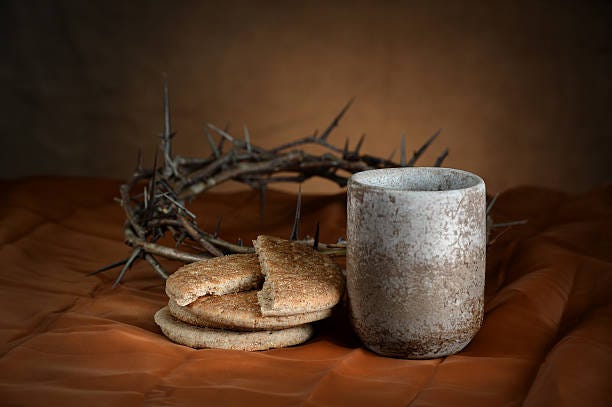Maundy Thursday: The Food of Love

On Palm Sunday, the anointed but-not-yet-coronated king entered the gates of Jerusalem to the shouts of “Hosanna,” save us, now, we pray, “Blessed is the King who comes in the name of the Lord.” They were echoing the declaration of the Father at Jesus’ baptism and Transfiguration. Jesus is God’s Son, the last Adam, the king of creation, the one to whom the dominion mission was given. Unlike the first Adam, Jesus did not grasp authority ahead of time. He waited on the Father’s timing and the gifts that the Father would give him in order to fulfill his task faithfully. Also unlike the first Adam, Jesus began with a sin-wracked world that lived under the dominion of death without resurrection. The King’s mission was to provide the forgiveness of sins, which would release the world from the dominion of sin and death, granting it life, and then pick up the dominion project to move the world from glory to glory.
Forgiveness of sins is fundamental to the creation moving forward into the glory that God destined for it in the beginning. In order to get right what Adam got wrong, Jesus would have to go back to the two trees in the midst of the Garden of Eden: the Tree of Life and the Tree of the Knowledge of Good and Evil. He would have to eat from both of them in the right way and order.
The Tree of Life was the first food that the man and woman were to eat. They would come back to it all of their lives, but it was the most basic food that they needed so that even in their immaturity they could handle it; indeed, they needed it. The problem for Jesus is that the Tree of Life is guarded by the flaming swords of the cherubim. Anyone who tries to eat of it will die. But that is where God will grant life. It is the first food that must be eaten. It is the fundamental food.
The Tree of the Knowledge of Good and Evil was more mature food; the food the man and woman would receive from God after they had been tested and proved that they could handle more responsibility. (For an explanation of this, see my article Two Trees & A King.) This is the last food. The King must eat from this Tree as well because it is the gift of wisdom and authority that aids him in his mission to discern between good and evil; what is best to move the creation forward as opposed to what hinders the project.
Because of sin, man is kept from both trees, being exiled from the Garden.
History progresses after the fall while the world waits for the King. God moves man and the creation forward in many respects, providing provisional (yet real) forgiveness of sins through repeated sacrifices so that history can move forward; so that the world is not in a death spiral with no resurrection. These sacrifices were gifts of God; food for God and man. Glimpses and shadows of the provision of food that would give life (righteousness) and wisdom (exaltation) were given throughout history in these sacrifices. Passover becomes one of those meals. The shedding and display of blood along with the meal–death–provide the forgiveness of sins, the passing over, so that the children of Israel can come out of their house-tombs to move into a new creation.
Jesus takes up this meal on the night he is betrayed, transforms it into his own meal, and declares that this meal and all that it represents is moving history forward into a new covenant; the old world going through death and resurrection. Jesus gives us this meal to declare to us that we are forgiven of our sins. Sin’s death no longer has dominion over us. We are resurrected with Christ and at peace with God.
But this is not an end in itself. Forgiveness of sins is foundational to providing us with the food of wisdom so that we can take dominion with the authority provided with the “strong food” provided in Christ Jesus. At this table, we begin with the “first food,” bread; the food that, after having been forgiven, energizes us for our mission. We end with “the last food,” wine; the mature food; the food that says that we sit as kings. At this table, we eat from both trees because this is the body and blood of our Lord Jesus who is both Life and Wisdom.
In this meal, Jesus calls us and prepares us for our mission of dominion. This meal is possible because of the forgiveness of sins; forgiveness we receive from God and forgiveness that we extend to one another.
On this night, Christ calls us to love one another as he has loved us. How has he loved us? He has forgiven us of our sins so that we can be at peace with God and with one another. We embody the reality of this meal only as we express our love in forgiveness, being at peace with one another. Only as we embody the forgiving love of Christ toward one another within the church is the church able to move forward, being changed from glory to glory and moving the creation from one stage of glory to another. Forgiveness of sins is foundational to working together to complete our mission.
Brothers, love one another as Christ has loved us. By this all men will know that we are his disciples if we have forgiving love for one another.
The post Maundy Thursday: The Food of Love appeared first on Kuyperian Commentary.

